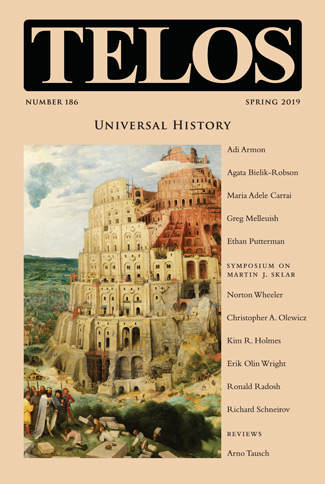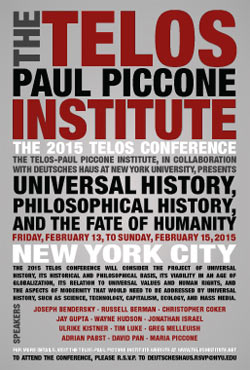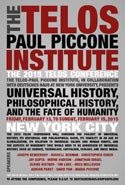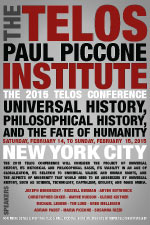By Agata Bielik-Robson · Wednesday, April 24, 2019 Agata Bielik-Robson’s “Marrano Universalism: Benjamin, Derrida, and Buck-Morss on the Condition of Universal Exile” appears in Telos 186 (Spring 2019). Read the full article at the Telos Online website, or purchase a print copy of the issue in our online store. Individual subscriptions to Telos are available in both print and online formats.
 In this article, I would like to outline a new strategy for the universalization of history, which emerges from an analysis of the modern Jewish practice of philosophizing. I call it a Marrano strategy, building an analogy between the religious practices of the late-medieval Sephardic Jewry, which was forced to convert to Christianity but kept Judaism “undercover,” and the philosophical intervention of modern Jewish thinkers who spoke the seemingly universal idiom of Western philosophy but, at the same time, impregnated it “secretly” with the motives deriving from their “particular” background. This secret particularist lining did not serve to abolish the universalist perspective, but merely to transform it; for the last heirs of this “Marrano” line, Walter Benjamin and Jacques Derrida, the proper universalism amounts to an after-Babel project of mending the broken whole from within, horizontally, without assuming the abstract position of a general meta-language, but through the multilingual “task of translation.” In this article, I would like to outline a new strategy for the universalization of history, which emerges from an analysis of the modern Jewish practice of philosophizing. I call it a Marrano strategy, building an analogy between the religious practices of the late-medieval Sephardic Jewry, which was forced to convert to Christianity but kept Judaism “undercover,” and the philosophical intervention of modern Jewish thinkers who spoke the seemingly universal idiom of Western philosophy but, at the same time, impregnated it “secretly” with the motives deriving from their “particular” background. This secret particularist lining did not serve to abolish the universalist perspective, but merely to transform it; for the last heirs of this “Marrano” line, Walter Benjamin and Jacques Derrida, the proper universalism amounts to an after-Babel project of mending the broken whole from within, horizontally, without assuming the abstract position of a general meta-language, but through the multilingual “task of translation.”
Continue reading →
By David Pan · Monday, March 18, 2019 Telos 186 (Spring 2019) is now available for purchase in our store. Individual subscriptions to Telos are also available in both print and online formats.
 This issue is devoted to the question of universal history and is based in part on a 2015 Telos-Paul Piccone Institute conference organized by Greg Melleuish. As this event suggested, universal history today imagines the convergence of humanity around a single trajectory of capitalist technological progress coupled with the defense of liberal rights. But as much as technology has increasingly linked the world into a single movement of history, we cannot say the same about liberal rights. Rather than pointing us toward the liberal light at the end of the historical tunnel, world politics seems to be casting us into the blazing arena of the “clash of civilizations” presaged by Samuel Huntington, with different regions of the world—Africa, America, Asia, Europe, the Muslim world—increasingly at odds, each region with a dominant civilization pursuing its own cultural and political hegemony. This divergence between a materialist unity of development and a cultural fragmentation frames the problem of universal history. This issue is devoted to the question of universal history and is based in part on a 2015 Telos-Paul Piccone Institute conference organized by Greg Melleuish. As this event suggested, universal history today imagines the convergence of humanity around a single trajectory of capitalist technological progress coupled with the defense of liberal rights. But as much as technology has increasingly linked the world into a single movement of history, we cannot say the same about liberal rights. Rather than pointing us toward the liberal light at the end of the historical tunnel, world politics seems to be casting us into the blazing arena of the “clash of civilizations” presaged by Samuel Huntington, with different regions of the world—Africa, America, Asia, Europe, the Muslim world—increasingly at odds, each region with a dominant civilization pursuing its own cultural and political hegemony. This divergence between a materialist unity of development and a cultural fragmentation frames the problem of universal history.
Continue reading →
By Matthew Bagot · Friday, February 26, 2016 Luigi Sturzo (1871–1959) was an Italian priest, social reformer and the founder in 1919 of the Popular Party that later became the Christian Democratic Party, and social theorist who wrote extensively about history during the last century. Regarding history, Sturzo’s great contribution is his account of the formation and development of the “International Community” as one of the concrete forms of human society subject to its general laws. Sturzo locates the roots of this concept in the Christian revelation of human equality before God and the subsequent religious duty to love one’s neighbor in a manner that transcends the traditional boundaries of the ancient world. Thus the social values of the pre-Christian world are inverted, and human personality assumes the mantle previously held by the social and ethnic bonds of that era.
Continue reading →
By Richard R. Weiner · Friday, March 27, 2015  Transnational history has emerged in the wake of the sprouting of international history, global history, and post-colonial history as historical subject fields in the 1990s academic marketplace. Chris Bayly’s 2004 book Birth of the Modern World, 1780–1914 is a landmark in the emergence of transnational history as an academic subject stressing the connectedness of history, as a narrative of accelerating cross-border métissage and intercontextuality. As another historian in this school, Sven Beckert, reminds us, transnational history is more than an academic brand; it is a fundamentally different analytical space and a social movement in itself. On the cover of Bayly’s book is a portrait by Anne-Louis Giradet, student of Jacques Louis David, who would be exiled in Brussels after 1815 with Emmanuel Sièyes as revolutionaries turned supporters of Bonaparte. Ironically, it hangs in in the Trianon at Versailles. It is a portrait of Citoyen Jean-Baptiste Belley of Saint Dominique, native of the slave port of Gorée in Senegal, comrade-in-arms of Toussaint L’Ouverture and the first Black Deputy to both the National Convention and the National Assembly. Belley’s silk cummerbund and the decoration of his hat assert the universalizing intention of the French Revolution, His light breaches express the sexual power of Rousseau’s noble savage, and refer to Bayly’s emphasis on bodily regimes. Belley leans against a bust on a marble plinth: the bust of the Encyclopèdiste Raynal, the most radical critic of slavery and the colonial policy of the Ancien Régime. Transnational history has emerged in the wake of the sprouting of international history, global history, and post-colonial history as historical subject fields in the 1990s academic marketplace. Chris Bayly’s 2004 book Birth of the Modern World, 1780–1914 is a landmark in the emergence of transnational history as an academic subject stressing the connectedness of history, as a narrative of accelerating cross-border métissage and intercontextuality. As another historian in this school, Sven Beckert, reminds us, transnational history is more than an academic brand; it is a fundamentally different analytical space and a social movement in itself. On the cover of Bayly’s book is a portrait by Anne-Louis Giradet, student of Jacques Louis David, who would be exiled in Brussels after 1815 with Emmanuel Sièyes as revolutionaries turned supporters of Bonaparte. Ironically, it hangs in in the Trianon at Versailles. It is a portrait of Citoyen Jean-Baptiste Belley of Saint Dominique, native of the slave port of Gorée in Senegal, comrade-in-arms of Toussaint L’Ouverture and the first Black Deputy to both the National Convention and the National Assembly. Belley’s silk cummerbund and the decoration of his hat assert the universalizing intention of the French Revolution, His light breaches express the sexual power of Rousseau’s noble savage, and refer to Bayly’s emphasis on bodily regimes. Belley leans against a bust on a marble plinth: the bust of the Encyclopèdiste Raynal, the most radical critic of slavery and the colonial policy of the Ancien Régime.
Continue reading →
By Kenneth Rasmussen · Thursday, March 12, 2015  Already in the first third of the 20th century, Karl Jaspers began formulating a philosophy that addressed the collapse of Enlightenment concepts of universal history and offered a perspective that could help us reformulate “universal history” as a viable concept. Jaspers’ work in this area is, I believe, underappreciated, and constitutes a realistic “cosmopolitan vision” that could help us address many of the thorny issues of global cultural conflict and diversity that we face today. Already in the first third of the 20th century, Karl Jaspers began formulating a philosophy that addressed the collapse of Enlightenment concepts of universal history and offered a perspective that could help us reformulate “universal history” as a viable concept. Jaspers’ work in this area is, I believe, underappreciated, and constitutes a realistic “cosmopolitan vision” that could help us address many of the thorny issues of global cultural conflict and diversity that we face today.
Continue reading →
By Telos Press · Friday, October 17, 2014  One last reminder that Monday is the deadline for submitting your abstract for next year’s Telos Conference in New York. The conference, which will take place on February 14-15, 2015, will focus on the theme of “Universal History, Philosophical History, and the Fate of Humanity.” For the full call for papers and other details, please visit the conference page at the Telos-Paul Piccone Institute website. If you wish to present a paper, send in your abstract (no more than 250 words) and a short c.v. to telosnyc@telosinstitute.net and place “The 2015 Telos Conference” in the email’s subject line. One last reminder that Monday is the deadline for submitting your abstract for next year’s Telos Conference in New York. The conference, which will take place on February 14-15, 2015, will focus on the theme of “Universal History, Philosophical History, and the Fate of Humanity.” For the full call for papers and other details, please visit the conference page at the Telos-Paul Piccone Institute website. If you wish to present a paper, send in your abstract (no more than 250 words) and a short c.v. to telosnyc@telosinstitute.net and place “The 2015 Telos Conference” in the email’s subject line.
Continue reading →
|
|
 In this article, I would like to outline a new strategy for the universalization of history, which emerges from an analysis of the modern Jewish practice of philosophizing. I call it a Marrano strategy, building an analogy between the religious practices of the late-medieval Sephardic Jewry, which was forced to convert to Christianity but kept Judaism “undercover,” and the philosophical intervention of modern Jewish thinkers who spoke the seemingly universal idiom of Western philosophy but, at the same time, impregnated it “secretly” with the motives deriving from their “particular” background. This secret particularist lining did not serve to abolish the universalist perspective, but merely to transform it; for the last heirs of this “Marrano” line, Walter Benjamin and Jacques Derrida, the proper universalism amounts to an after-Babel project of mending the broken whole from within, horizontally, without assuming the abstract position of a general meta-language, but through the multilingual “task of translation.”
In this article, I would like to outline a new strategy for the universalization of history, which emerges from an analysis of the modern Jewish practice of philosophizing. I call it a Marrano strategy, building an analogy between the religious practices of the late-medieval Sephardic Jewry, which was forced to convert to Christianity but kept Judaism “undercover,” and the philosophical intervention of modern Jewish thinkers who spoke the seemingly universal idiom of Western philosophy but, at the same time, impregnated it “secretly” with the motives deriving from their “particular” background. This secret particularist lining did not serve to abolish the universalist perspective, but merely to transform it; for the last heirs of this “Marrano” line, Walter Benjamin and Jacques Derrida, the proper universalism amounts to an after-Babel project of mending the broken whole from within, horizontally, without assuming the abstract position of a general meta-language, but through the multilingual “task of translation.”  Transnational history has emerged in the wake of the sprouting of international history, global history, and post-colonial history as historical subject fields in the 1990s academic marketplace. Chris Bayly’s 2004 book Birth of the Modern World, 1780–1914 is a landmark in the emergence of transnational history as an academic subject stressing the connectedness of history, as a narrative of accelerating cross-border métissage and intercontextuality. As another historian in this school, Sven Beckert, reminds us, transnational history is more than an academic brand; it is a fundamentally different analytical space and a social movement in itself. On the cover of Bayly’s book is a portrait by Anne-Louis Giradet, student of Jacques Louis David, who would be exiled in Brussels after 1815 with Emmanuel Sièyes as revolutionaries turned supporters of Bonaparte. Ironically, it hangs in in the Trianon at Versailles. It is a portrait of Citoyen Jean-Baptiste Belley of Saint Dominique, native of the slave port of Gorée in Senegal, comrade-in-arms of Toussaint L’Ouverture and the first Black Deputy to both the National Convention and the National Assembly. Belley’s silk cummerbund and the decoration of his hat assert the universalizing intention of the French Revolution, His light breaches express the sexual power of Rousseau’s noble savage, and refer to Bayly’s emphasis on bodily regimes. Belley leans against a bust on a marble plinth: the bust of the Encyclopèdiste Raynal, the most radical critic of slavery and the colonial policy of the Ancien Régime.
Transnational history has emerged in the wake of the sprouting of international history, global history, and post-colonial history as historical subject fields in the 1990s academic marketplace. Chris Bayly’s 2004 book Birth of the Modern World, 1780–1914 is a landmark in the emergence of transnational history as an academic subject stressing the connectedness of history, as a narrative of accelerating cross-border métissage and intercontextuality. As another historian in this school, Sven Beckert, reminds us, transnational history is more than an academic brand; it is a fundamentally different analytical space and a social movement in itself. On the cover of Bayly’s book is a portrait by Anne-Louis Giradet, student of Jacques Louis David, who would be exiled in Brussels after 1815 with Emmanuel Sièyes as revolutionaries turned supporters of Bonaparte. Ironically, it hangs in in the Trianon at Versailles. It is a portrait of Citoyen Jean-Baptiste Belley of Saint Dominique, native of the slave port of Gorée in Senegal, comrade-in-arms of Toussaint L’Ouverture and the first Black Deputy to both the National Convention and the National Assembly. Belley’s silk cummerbund and the decoration of his hat assert the universalizing intention of the French Revolution, His light breaches express the sexual power of Rousseau’s noble savage, and refer to Bayly’s emphasis on bodily regimes. Belley leans against a bust on a marble plinth: the bust of the Encyclopèdiste Raynal, the most radical critic of slavery and the colonial policy of the Ancien Régime.  Already in the first third of the 20th century, Karl Jaspers began formulating a philosophy that addressed the collapse of Enlightenment concepts of universal history and offered a perspective that could help us reformulate “universal history” as a viable concept. Jaspers’ work in this area is, I believe, underappreciated, and constitutes a realistic “cosmopolitan vision” that could help us address many of the thorny issues of global cultural conflict and diversity that we face today.
Already in the first third of the 20th century, Karl Jaspers began formulating a philosophy that addressed the collapse of Enlightenment concepts of universal history and offered a perspective that could help us reformulate “universal history” as a viable concept. Jaspers’ work in this area is, I believe, underappreciated, and constitutes a realistic “cosmopolitan vision” that could help us address many of the thorny issues of global cultural conflict and diversity that we face today. 







